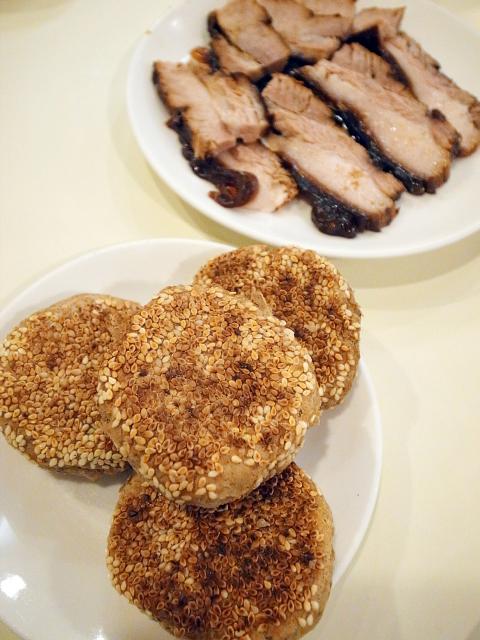Having started as a food stand in Kaohsiung in 1949 and moved to Taipei in the 1960s, the family-run Beijing Do It True is a local legend. It boasts a culinary heritage from a famed relative who served as an imperial chef for Empress Dowager Cixi (慈禧太后) and it has been visited by movers and shakers of the political world such as former US president George H.W. Bush, former premier Sun Yun-suan (孫運璿), and Wego Chiang (蔣緯國), Chiang Kai-shek’s (蔣介石) second son.
But to many people like myself, the restaurant is simply a place to seek solace in childhood foods.
As its English name suggests, Beijing Do It True takes pride in its authenticity. No self-respecting foodie would leave the establishment without sampling its famed northern Chinese specialty, spicy braised pork (醬肉, NT$160) wrapped in a Chinese sesame bun (芝麻醬燒餅, NT$40 each). Stewed in the restaurant’s signature sauce for hours and served at room temperature, the fatty pork has a melt-on-the-tongue deliciousness, and its buttery texture makes a heavenly match with the masterfully baked bun that, unlike the dry versions served up in similar establishments, is crispy on the outside and has layers of tenderness inside.

Photo: Ho Yi, Taipei Times
Chinese fried jumbo dumpling (褡褳火燒, NT$200 for four) is almost extinct in Taiwan’s culinary landscape. With its shape resembling talien (褡褳), a type of bag used in northern China during ancient times, the traditional Beijing snack food is similar to pan-fried dumplings (鍋貼), but three times the size. Do It True’s rendition is filled with minced pork, shrimp and leek sprouts and goes well with the green bean and millet congee (綠豆小米稀飯, NT$25).
My personal favorite is the Chinese-style deep-fried meatballs (炸丸子, NT$260). When I was little, seeing a plate of these tiny fried morsels on the dining table would make my day, and at the restaurant, they taste exactly as I remember them.
First braised with dozens of spices and then smoked using pine cones, the pine-smoked chicken (松子燻雞, NT$270) is restaurant helmer Hsu Han-hsiang’s (徐翰湘) upgraded version of a perennial northern Chinese delicacy.
For those looking for something to clean the palate, the sour cabbage with bean curd stripes (涼拌白菜心, NT$160) surpasses its bland counterparts with an apt amount of tart, vinegary aroma, and the same goes for the delightful sour cabbage and white pork meat soup (酸菜白肉湯, NT$150), which can also be made into a hot pot.
Other popular dishes include the braised eggplant (燒茄子, NT$220), said to be favored by film star Brigitte Lin (林青霞). The Chinese red dates and silver ear fungus soup (紅棗銀耳羹, NT$90) is reported to have been one of Empress Dowager Cixi’s favorite desserts.
Though Do It True has an extensive menu, there are still quite a few specialties not written in the book and reserved for those in the know. Among them, the pizza-sized scallion pancake (蔥油餅, NT$800) is said to require a preparation so meticulous that the chef can only produce three dishes a day (call ahead to order).
Some notes: The cold appetizers offered by the waitstaff before you order are not complementary. Food comes in small and medium portions at Do It True, and groups of four or less should stick with small dishes. The prices noted in this review are for small sizes.

Towering high above Taiwan’s capital city at 508 meters, Taipei 101 dominates the skyline. The earthquake-proof skyscraper of steel and glass has captured the imagination of professional rock climber Alex Honnold for more than a decade. Tomorrow morning, he will climb it in his signature free solo style — without ropes or protective equipment. And Netflix will broadcast it — live. The event’s announcement has drawn both excitement and trepidation, as well as some concerns over the ethical implications of attempting such a high-risk endeavor on live broadcast. Many have questioned Honnold’s desire to continues his free-solo climbs now that he’s a

As Taiwan’s second most populous city, Taichung looms large in the electoral map. Taiwanese political commentators describe it — along with neighboring Changhua County — as Taiwan’s “swing states” (搖擺州), which is a curious direct borrowing from American election terminology. In the early post-Martial Law era, Taichung was referred to as a “desert of democracy” because while the Democratic Progressive Party (DPP) was winning elections in the north and south, Taichung remained staunchly loyal to the Chinese Nationalist Party (KMT). That changed over time, but in both Changhua and Taichung, the DPP still suffers from a “one-term curse,” with the

Jan. 26 to Feb. 1 Nearly 90 years after it was last recorded, the Basay language was taught in a classroom for the first time in September last year. Over the following three months, students learned its sounds along with the customs and folktales of the Ketagalan people, who once spoke it across northern Taiwan. Although each Ketagalan settlement had its own language, Basay functioned as a common trade language. By the late 19th century, it had largely fallen out of daily use as speakers shifted to Hoklo (commonly known as Taiwanese), surviving only in fragments remembered by the elderly. In

William Liu (劉家君) moved to Kaohsiung from Nantou to live with his boyfriend Reg Hong (洪嘉佑). “In Nantou, people do not support gay rights at all and never even talk about it. Living here made me optimistic and made me realize how much I can express myself,” Liu tells the Taipei Times. Hong and his friend Cony Hsieh (謝昀希) are both active in several LGBT groups and organizations in Kaohsiung. They were among the people behind the city’s 16th Pride event in November last year, which gathered over 35,000 people. Along with others, they clearly see Kaohsiung as the nexus of LGBT rights.